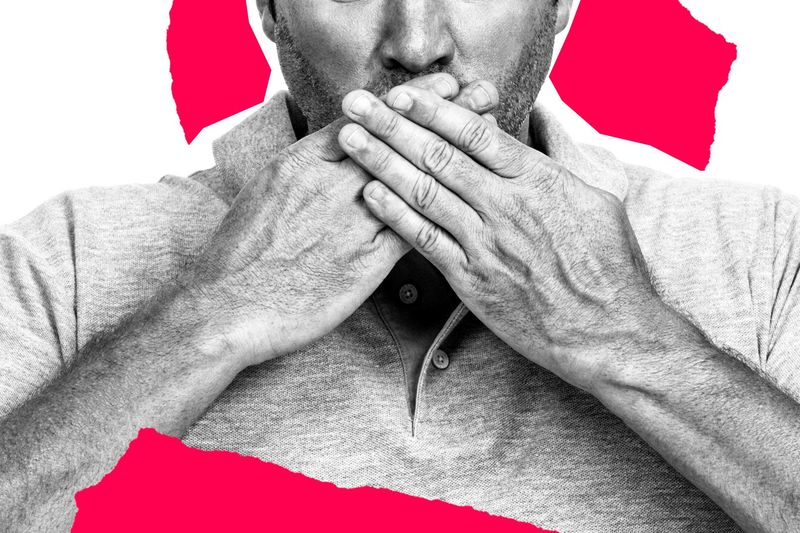18 Phrases To Wipe From Your Vocabulary—They Come Off As Arrogant
You ever have one of those moments where someone says a single sentence and the whole room changes? Maybe it was at Thanksgiving, or during a meeting, or just texting with a friend. Suddenly, you’re not listening anymore, you’re calculating how fast you can escape.
Some words just suck the air out of the place—and whether we mean it or not, some phrases sound like we’re walking around with our nose in the clouds.
Here’s the truth: None of us wants to be the arrogant one. We want to connect, to be honest, to be heard. But the way we talk sometimes gets in the way. That’s why I’m laying it all out—18 phrases that come off as arrogant, even if you’re just trying to keep it real.
Maybe you’ve said a few of these (I have), or maybe you’ve been on the receiving end. Either way, it’s time to call them out, learn from them, and talk like we actually care about each other.
1. “I don’t mean to brag, but…”

You know that split second before someone drops this line? The energy in the room shifts. People brace themselves, waiting for the humblebrag that’s about to land like a lead balloon.
We all want to share our wins. There’s nothing wrong with being proud of what you’ve done, but starting with “I don’t mean to brag” just makes it obvious you might actually want to. It’s like apologizing for being about to step on someone’s toes, then stomping away anyway.
If you’re truly sharing out of excitement or gratitude, just share. Let the moment be true, without the weird disclaimer. Your story will land better if it feels like an invitation instead of a performance. Real connection doesn’t need a spotlight—or a warning label.
2. “I already knew that…”

Think of how it feels when someone tries to contribute and the reply is, “I already knew that.” Suddenly, all the air goes out of the conversation. The person who spoke first? They shrink back a little.
Even if you’re ten steps ahead, pretending not to be doesn’t cost you your intelligence. It’s not about dumbing yourself down; it’s about leaving space for other people to add value. No one likes feeling like their help or perspective is pointless.
Instead, try building on what’s shared. Ask a question or show curiosity. If you must, say, “That’s a great point, and I’d love to hear more.” Your confidence shows louder when you don’t have to announce what you know.
3. “I’m pretty sure that…”

Here’s the thing: “I’m pretty sure that…” sounds confident until you hear it from someone who acts like they have all the answers. Then, it’s less about being sure, and more about shutting down the conversation.
I caught myself saying this once during a book club, and everyone’s faces just—froze. It’s not awful to be certain, but when you always lead with your own certainty, people stop feeling like their opinions matter.
What if, instead, you left some room for questions? Curiosity connects people. Certainty, especially the performative kind, disconnects. Give others a chance to play in the conversation, too.
4. “No offense, but…”

There’s a split second after someone says this where you just know something cutting is coming. It’s the verbal equivalent of bracing for impact—”No offense, but…” and then boom, here comes the dig.
It rarely softens the blow. In fact, it usually makes what follows even sharper, because you know the speaker knew it would sting. It’s a pre-emptive disclaimer for being rude, and it never lands well.
If you have feedback or criticism, just offer it directly, with care. Trust that honesty and kindness can live in the same sentence. People remember how you made them feel, not just what you said.
5. Overusing “I” or “me”

Have you ever been in a group where one person’s voice fills every pause? Maybe you tried to jump in, but couldn’t find a gap. That’s what happens when “I” or “me” takes over the script.
It’s easy to see why we do it—we want to be understood, or we’re nervous, or we just have a lot to say. But if your stories always orbit around you, people start to drift. They feel less like part of the story and more like your audience.
Real conversation is a back-and-forth. It’s about listening as much as talking. Try counting how many times you say “I” next time—you might be surprised.
6. “Oh, I’m just kidding!”

Some jokes don’t land, and the instant “Oh, I’m just kidding!” is supposed to smooth things over. But let’s be honest—sometimes it’s just a way to hide a jab in a joke.
Humor can connect, but it can also become a shield for being unkind. How many times have you laughed something off, then thought about it later and realized it hurt a little? I know I have.
If you cross a line, own it, don’t brush it off. Apologize, ask how they’re feeling, and try again. The best relationships are built on trust, not on dodging responsibility with a laugh.
7. “You probably don’t know this, but…”

This phrase lands like a lecture, not a conversation. It’s the verbal version of patting someone on the head—”You probably don’t know this, but…” and suddenly, you’re the wise one, and they’re the student.
If you want to share something you know, just share it. Assume the person you’re talking to is smart enough to keep up. You don’t need to set the stage by making yourself the expert and them the rookie.
People remember how you made them feel long after they forget what you said. Curiosity and respect go further than any fact-drop ever did.
8. “I’m surprised you’re having problems with this. It’s so easy!”

If you’ve ever struggled with something and someone said this to you, you know how small it can make you feel. It’s like your confusion is a personal failing, not just a normal part of learning.
Everyone moves at their own pace. What’s easy for you might be tough for someone else, and that’s not a crime. Saying “It’s so easy!” just builds a wall between you and the person who needs help.
Patience and empathy change everything. Instead of policing how hard something should be, offer a hand. People remember who helped when they felt lost, not who judged them.
9. “You just don’t get it.”

There’s defeat baked into this phrase. “You just don’t get it” ends the conversation, and sometimes, the relationship feels like it’s wobbling after that, too.
You might be right—they might not get it. But announcing it like a final verdict? It’s one of those things that closes doors, instead of opening them. People crave being understood, not dismissed.
Instead, try sharing your perspective or asking questions. You might both learn something. Connection is built on the willingness to bridge the gap, not point it out.
10. “If I were you, I’d…”

Advice can be a gift, but sometimes it comes wrapped in control. “If I were you, I’d…” can land like a dismissal of someone else’s reality, not an offer of help.
We’ve all heard it, or said it, maybe when we just wanted to fix things for someone we love. But we’re not living their life, wearing their shoes, facing their choices. Adding our own “woulds” to the mix can make people feel small or judged.
Try asking what they need instead. Or say, “I’m here for whatever you decide.” Let people own their story. Support feels better than steering.
11. “Actually…” (as a correction)

You ever get halfway through your thought and someone cuts in with, “Actually…”? It’s like a speed bump appeared mid-sentence, and suddenly, you’re not sure if you want to keep talking.
It’s especially grating when it’s used to nitpick minor details, or when it turns a conversation into a competition. People usually aren’t looking for a fact-check; they want to be heard and understood.
Next time, let the conversation breathe. Ask if they’re open to another viewpoint, or just listen. You can be right without being righteous.
12. “Let me educate you.”

It’s one thing to share what you know. It’s another to announce yourself as someone’s teacher, especially when no one asked for a lesson. “Let me educate you” nearly always lands as condescending.
Maybe you have important information, but opening with this phrase rarely inspires curiosity—it just puts people on guard. It’s easy to forget that nobody likes being talked down to, especially by a peer.
If you want to help, offer your thoughts gently, or ask if someone wants your opinion. Most times, people want a conversation, not a classroom.
13. “That’s just how I am.”

There’s a kind of finality to this one. “That’s just how I am” is a wall, not a bridge. It shuts down the idea that we can grow, change, or do better.
I get it—sometimes we’re tired, overwhelmed, or scared to face our flaws. But hiding behind this phrase means you miss out on deeper connection and understanding. Growth isn’t weakness, it’s strength.
Instead, try, “I’m working on it,” or, “I want to do better.” Vulnerability is way more magnetic than stubbornness. People are drawn to those who are honest about their rough edges.
14. “You wouldn’t understand.”

You can almost feel the door slam shut with this one. “You wouldn’t understand” tells the other person they’re on the outside, and you’re somewhere they can’t reach.
Most people want to be let in, to be trusted with your mess and your magic. Using this phrase robs them of that chance; it also makes you seem like you think your experiences are too special for anyone else to grasp.
Instead, explain what you can or invite them to ask questions. Give people the dignity of trying to understand, even if they don’t get it perfectly.
15. “I guess you just don’t care.”

It stings, right? “I guess you just don’t care” is like tossing a grenade into a conversation—it’s not just about the topic, it’s about who the other person is. It’s a shortcut to guilt, and it rarely fixes the issue.
We throw this out when we feel ignored, but what we really want is reassurance, not a fight. Unfair accusations push people away, even if you’re hurting. The people who care about us most are human—they miss signals, drop balls, get wrapped up in their own stuff.
Ask for what you need. Let yourself be vulnerable. There’s more power in a quiet, honest request than any accusation could ever have.
16. “It’s not my fault.”

Blame-shifting is a sport we all play sometimes. “It’s not my fault” is the ultimate distance-maker. It’s self-protection, but it can come off as ducking responsibility.
Owning your mistakes takes courage, and it draws people in. You don’t have to be perfect—just honest. People respect someone who admits when they’ve messed up, instead of scrambling to dodge the fallout.
Try saying, “Here’s what I could have done differently.” Even if it’s hard. Accountability is magnetic. Dodging blame? Not so much.
17. “I’m just being honest.”

Honesty, when it’s real, can repair almost anything. But “I’m just being honest” sometimes gets used like a brick, tossed through a window. It’s honesty weaponized, not kindness offered.
We use it to excuse saying things that are harsh or unnecessary. The truth isn’t always what people need most—sometimes they need compassion, or someone to sit with their struggle. If your honesty leaves someone bleeding, it’s worth asking if it was really for their good, or for your own relief.
Try blending honesty with care. Speak the truth, but wrap it in love. It matters.
18. “I just have high standards.”

High standards aren’t a crime—but announcing them like a badge? That’s where arrogance creeps in. “I just have high standards” signals that you think you’re above the crowd, even if you’re not trying to.
People hear this and feel measured, not motivated. It creates pressure to perform, not space to grow. Sometimes, it’s just a mask for perfectionism or fear of being let down.
Instead, be clear about your needs, but stay open to different ways of reaching them. True excellence isn’t about judgment—it’s about learning, together.







